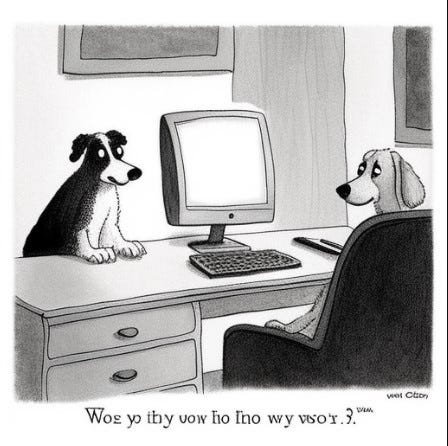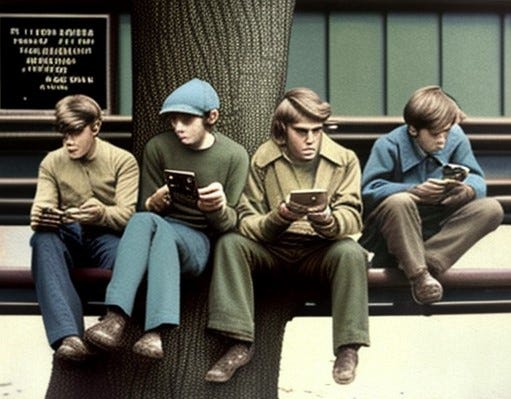The Internet has always had a problem with fakes. AI makes it much worse.
Are you a real person? You might soon be asked to prove it. And that's ultimately a good thing.
On the Internet, nobody knows you're AI pretending to be a dog. Source: Midjourney.
For years now, I have been saying to anyone who will listen [1] that the core problem with the Internet is not what most people think it is. It's not incivility or hate speech or tribalism. It's not disinformation, pornography, alternate facts, fake news, fake nudes, social engineering scams, atrocious spelling, AI models secretly plotting to enslave humanity, loudmouth ex-Presidents, or Jewish Space Lasers. [2]
The core problem with the Internet is identity. Or, more accurately, the lack thereof.
Without identity, there's no accountability. And right now, with very few exceptions, people can operate anonymously on the Internet with near-perfect impunity. If someone commits a crime online -- defamation or impersonation, selling drugs or pushing kiddie porn -- it is technically possible to track down their legal identity, but it takes the resources and reach of law enforcement, and there's only so much of that to go around.
Ninety-nine percent of the time these people are like monkeys sitting in trees, raining feces down upon the rest of us. They can say or do virtually anything they want, with minimal consequences. And that either leads to, or makes much worse, nearly all of the bad stuff I mentioned in the first paragraph. [3]
The Monkees, tweeting in a tree. Source: Midjourney.
Take social engineering scams, for one easy example. They work by fooling gullible people into believing the entity they're communicating with is someone they're not -- whether it's a phishing email that looks like it came from your bank, or somebody pretending to be Elon Musk so he can siphon $100K out of your charter school's bank account. [4]
A bot army, like the ones used to launch attacks and spread misinformation across Twitter, is simply a collection of automated fakes. This is one reason why Elon Musk's grand plan to remove Twitter's existing verification system and replace it with a revenue generating/extortion scheme is such a mind-numbingly stupid idea. [5]
The robots enter the conversation
I've spent a good portion of the last 20 years writing about faux accounts on social media: fake Linkedin accounts used by hackers, zombie blondes invading Facebook, how to spot a Twitter bot, how to buy phony followers on Instagram, etc. There's a thriving cottage industry devoted to creating and selling fake accounts for use by hackers, scammers, black-hat SEO types, and other online bottom feeders. There are probably still some fake MySpace and AOL accounts for sale on the floating plastic garbage heap that is the Internet.
Into this mess enters Generative AI. Why use humans to generate fakes when a machine will do a much more convincing job of it? Machine-generated speech and images have improved to the point where they are pretty much indistinguishable from the real thing. That means the Internet's Fakes Problem just got exponentially worse.
In the real world, when we need to know that someone is whom they claim to be, we rely on third parties (like the government) to verify that. These sources are far from foolproof, as anyone who ever acquired a fake ID so they could buy beer in high school can tell you. [6] But they're the best we got. Even then, half the world's population does not have access to a verifiable legal ID.
Now some smart folks are working on systems to provide "proof of personhood" using blockchain/crypto technology. World ID is a free, open protocol designed to help organizations verify that you are a living, breathing, farting human. To wit:
One way to think about World ID is as a global digital passport that lives locally on its holder’s phone. World ID’s most important property is that the holder can use it to prove that they are a real and unique person without sharing personal data using zero-knowledge proofs.
Meet The Orb, an iris scanner that uses World ID to verify you're a real person.
Yes, the HAL 9000 and a Magic 8-Ball had a love child. Source: Worldcoin.
Essentially, it takes a digital picture of your eye, converts the data into a unique number, then compares it against other numbers in the World ID database to determine it's not a duplicate. That number goes into the blockchain, which can then be polled by other apps or Internet services to confirm that yes, you are a human, without revealing any other personal information. [7]
Hey hey, we're not the Monkeys
Verifying humanness is one step toward combating fakes. Another is having a persistent pseudo-identity that follows you from site to site. [8] When you have persistent identities, you can start to enable reputation systems, penalize people who are determined to act like assholes, and make it harder for them to spin up other fake accounts.
It's an idea whose time is long overdue. Because I think we've all had our fill of monkeys hurling turds.
Are you a Daydream Believer, or still waiting for the Last Train to Clarksville? Share your thoughts, real or imaginary, in the comments below.
[1] Most often my cat, but half the time I think she's just pretending.
[2] Not actually responsible for forest fires, but excellent at toasting bagels from low-earth orbit.
[3] Except maybe atrocious spelling.
[4] To quote the victim of this scam, the now-former school principal Jan McGee, "I am a very smart lady." Sure, Jan.
[5] Yes, requiring people to pay for a blue check mark does verify they have a working app store account and/or credit card. But there's no real identity matching; people can still pretend to be whomever they want to be. Is that tweet from the official New York Times account, or one of the fakes? This is the exact problem blue check marks were intended to solve. But now, anybody with $8 in their pocket can gin up their own "New York Times" Twitter account, and let the rest of us figure it out.
[6] I plead the Fifth.
[7] You don't have to have your eye scanned to use World ID. But iris scans are the most reliable biometric, more accurate than fingerprints or facial scans, even if they are a little too Minority Report-ish.
[8] In other words, if you're WTpooh666 on Twitter or Instagram, you're WTpooh666 everywhere else. And if you misbehave, no more honey for you.





No more bulges in your pants! (i.e. keys and wallets)
Using a truly decentralized blockchain is critical. Having a government or a billionaire control it would be magnitudes worse than what we have now. "Sorry, you don't exist."
No doubt tech will figure out who's a real person and who's not but to quote the late great John Prine, some humans ain't human! (ps-- I nearly spit my coffee out over the lovechild!).